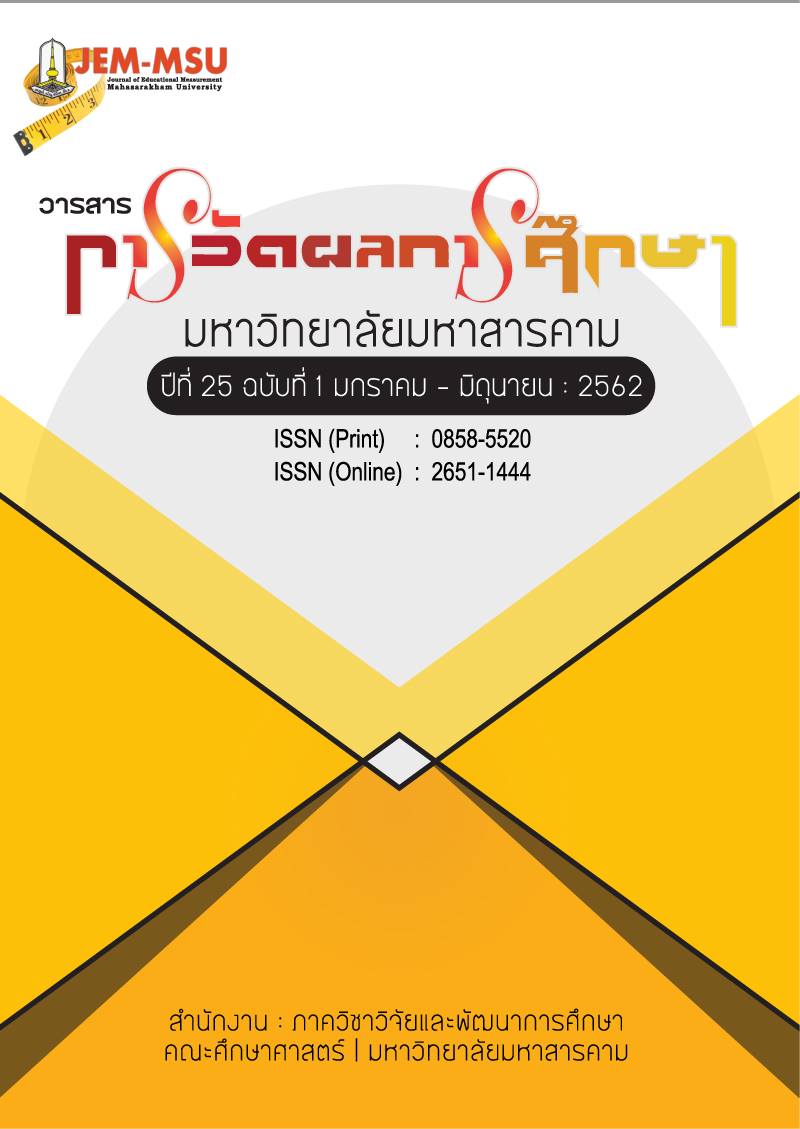Development of Curriculum Management and Organizing Learning Activities According to the Sufficiency Economy Philosophy for Schools under Kalasin Provincial Administrative Organization
Main Article Content
Abstract
This research aimed to: 1) study the present conditions and desirable conditions of curriculum management and organizing learning activities according to the Sufficiency Economy Philosophy for schools under Kalasin Provincial Administrative Organization; 2) to construct guidelines on curriculum management and organizing learning activities according to the Sufficiency Economy Philosophy for schools under Kalasin Provincial Administrative Organization. The research was divided into 2 phases. Phase 1 was for data collection. It was divided into two parts. Part 1: was the study of the present conditions and desirable conditions of curriculum management and organizing learning activities according to the Sufficiency Economy Philosophy for schools under Kalasin Provincial Administrative Organization. The sample consisted of school personnel in Kalasin Provincial Administrative Organization in the academic year 2017, comprising 14 administrators, 207 teachers, totally 221 people from 12 schools, obtained through cluster random sampling, using the school as the sampling unit. The tools used were a 5-point rating scale questionnaire inquiring about the present conditions and desirable conditions of curriculum management and organizing learning activities according to the Sufficiency Economy Philosophy for schools under Kalasin Provincial Administrative Organization. It had 4 components and 33 indicators; the discrimination (rXY) ranged from 0.26 to 0.73, and the total reliability was 0.90. Part 2 was the study on the best practices of 3 schools by interviewing the administrators, heads of learning strands and 3 concerned teachers in each school; 9 teachers altogether were purposively sampled. The tool used was a semi-structured interview form with 4 components and 12 items. Phase 2 was the construction of guidelines on curriculum management and organizing learning activities according to the Sufficiency Economy Philosophy for schools under Kalasin Provincial Administrative Organization, using the data from both parts of Phase 1 in the construction. A focus group of 9 certified scholars was held to discuss the suitability of the guidelines. Suggestions were collected to be used in the improvement of the guidelines on curriculum management and organizing learning activities according to the Sufficiency Economy Philosophy for schools under Kalasin Provincial Administrative Organization. The tools used were an observation form for the focus group discussion and a feasibility questionnaire. The statistics employed were the mean and standard deviation.
The findings are as follows:
1. The study on the present conditions and desirable conditions of curriculum management and organizing learning activities according to the Sufficiency Economy Philosophy for schools under Kalasin Provincial Administrative Organization, which had 4 components, revealed that all of the 33 indicators passed the criterion (= 4.24-4.60). That is, the present conditions as a whole were at a high level (
= 4.35), the desirable conditions as a whole were at a high level (
= 4.50), and the study on the best practice of the schools, which had 4 components, revealed that the interviews with the administrators, heads of the learning strands, and concerned teachers, brought about more indicators: from 33 indicators formerly to 50 indicators, which would be further used in the analysis in Phase 2.
2. The construction of the guidelines on curriculum management and organizing learning activities according to the Sufficiency Economy Philosophy for schools under Kalasin Provincial Administrative Organization made use of the data in Phase 1 and the results of the focus group discussion and assessed the feasibility of the guidelines on curriculum management and organizing learning activities according to the Sufficiency Economy Philosophy for schools under Kalasin Provincial Administrative Organization. The components remained to be 4 but the indicators became 38, all of which passed the criterion (= 4.42-4.58). Therefore, the results of the analysis in Phase 2 were used in constructing an appropriate manual of the guidelines on curriculum management and organizing learning activities according to the Sufficiency Economy Philosophy for schools under Kalasin Provincial Administrative Organization.
Article Details
The content and information contained in the published article in the Journal of Educational Measurement Mahasarakham University represent the opinions and responsibilities of the authors directly. The editorial board of the journal is not necessarily in agreement with or responsible for any of the content.
The articles, data, content, images, etc. that have been published in the Journal of Educational Measurement Mahasarakham University are copyrighted by the journal. If any individual or organization wishes to reproduce or perform any actions involving the entirety or any part of the content, they must obtain written permission from the Journal of Educational Measurement Mahasarakham University.
References
กรมส่งเสริมการปกครองท้องถิ่น. (2559). ยุทธศาสตร์กรมส่งเสริมการปกครองท้องถิ่น พ.ศ. 2560 – 2569. กรุงเทพฯ: กองยุทธศาสตร์และแผนงาน กรมส่งเสริมการปกครองท้องถิ่น.
กระทรวงศึกษาธิการ. (2544). หลักสูตรการศึกษาขั้นพื้นฐาน พุทธศักราช 2544. กรุงเทพฯ: พัฒนาคุณภาพวิชาการ.
จิราพร ผุยผง. (2560). การพัฒนาแนวทางการบริหารจัดการหลักสูตรและการจัดกิจกรรมการเรียนรู้ตามหลักปรัชญาของเศรษฐกิจพอเพียงสำหรับโรงเรียนสังกัดสำนักงานเขตพื้นที่การศึกษามัธยมศึกษา เขต 27. วิทยานิพนธ์การศึกษามหาบัณฑิต มหาวิทยาลัยมหาสารคาม.
ถวัลย์ มาศจรัส. (2550). MODEL การจัดการเรียนรู้ตามแนวปรัชญาพระราชทานเศรษฐกิจพอเพียง. กรุงเทพฯ: ธารอักษร.
ปรียานุช พิบูลสราวุธ. (2550). การขับเคลื่อนเศรษฐกิจพอเพียงด้านการศึกษา. กรุงเทพฯ : ศูนย์ประสานงานกลางการดำเนินงานโครงการอันเนื่องจากพระราชดำริสำนักงานปลัดกระทรวงศึกษาธิการ.
พรทิพย์ บรรเทา. (2558). แนวทางการบริหารสถานศึกษาตามหลักปรัชญาของเศรษฐกิจพอเพียงของสถานศึกษาในสังกัดสำนักงานเขตพื้นที่การศึกษามัธยมศึกษา เขต 19 (เลย-หนองบัวลำภู).วิทยานิพนธ์การศึกษามหาบัณฑิต มหาวิทยาลัยมหาสารคาม.
รุ่งฤดี โชติวิเชียร. (2558). การพัฒนารูปแบบการจัดการศึกษาตามแนวปรัชญาของเศรษฐกิจพอเพียงในสถานศึกษา สังกัดสำนักงานเขตพื้นที่การศึกษาประถมศึกษากาฬสินธุ์ เขต 1.วารสารศึกษาศาสตร์มหาวิทยาลัยมหาสารคาม, 9(ฉบับพิเศษ), 686-709.
สำนักงานคณะกรรมการสถานศึกษาขั้นพื้นฐาน. (2554). หนังสือราชการ เรื่อง การขับเคลื่อนหลักปรัชญาของเศรษฐกิจพอเพียงสู่สถานศึกษา. ลงวันที่ 17 กุมภาพันธ์ 2554.
สำนักงานคณะกรรมการพัฒนาเศรษฐกิจและสังคมแห่งชาติ. (2550). เศรษฐกิจพอเพียงคืออะไร / สำนักงานคณะกรรมการพัฒนาการเศรษฐกิจและสังคมแห่งชาติ.(พิมพ์ครั้งที่ 4). กรุงเทพฯ:คณะอนุกรรมการขับเคลื่อนเศรษฐกิจพอเพียง สำนักงานคณะกรรมการพัฒนาการเศรษฐกิจและสังคมแห่งชาติ.
สุนัย เศรษฐ์บุญสร้าง. (2551). การเรียนรู้ร่วมกันแบบมีเข็มมุ่งสู่วิถีเศรษฐกิจพอเพียง. กรุงเทพฯ : ซีเอ็ดยูเคชั่น.

